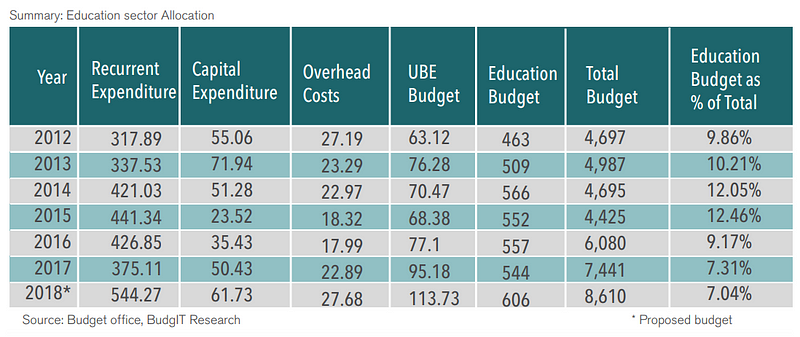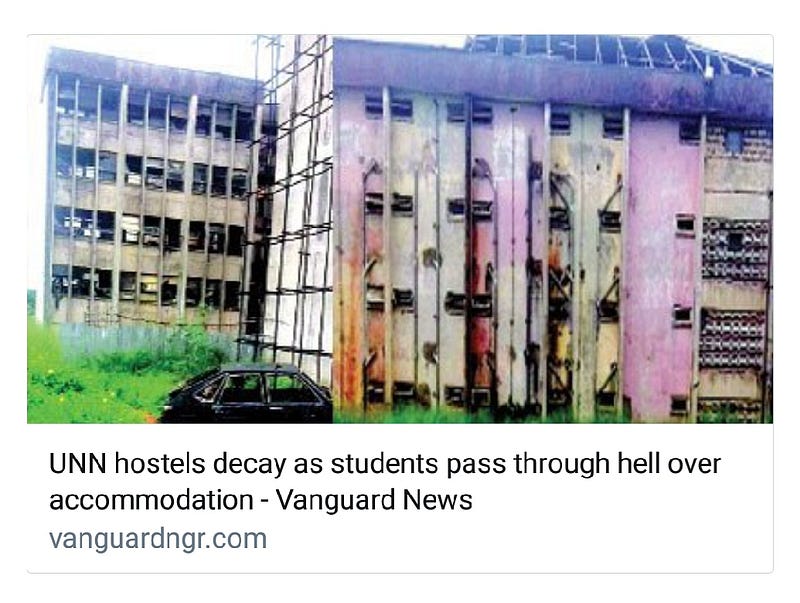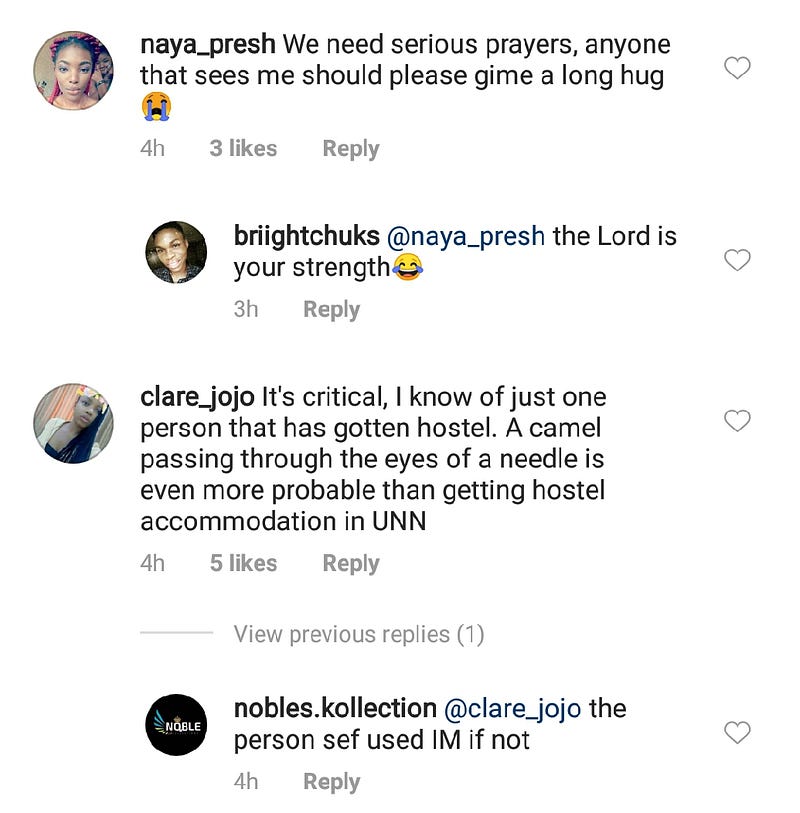Despite increase in tuition fees and loss of jobs, there are more young persons pursuing higher education now than ever. According to UNESCO, there are over 100M young adults within the ages of 18 to 22 years studying a course or another in Polytechnics, Universities, and Colleges Of Education across Africa (15M in Nigeria)
With this increasing college population comes heavy pressure on the already dilapidated on-campus accommodation that can house only about 20% — 30% of students.
Without mincing of words, if you agree with the Federal Mortgage Bank of Nigeria that there’s a housing deficit estimated between 17–20 million, you will do well to agree that student housing makes a very large amount of that deficit.
Education Funding
The lack of enough bed-spaces to accommodate the millions in Nigerian colleges doesn’t come as a surprise as Education funding in Nigeria has been on a steady decline from 12.46% in 2015 to 7.04% of the total Federal Government budget in 2018.

That only a paltry sum of N5.57B is to be spent by the Federal Government on capital items in 36 Federal Universities makes the situation even more pathetic.
What is even more shocking is the restriction of universities from developing physical structures with their federal allocations by the Federal Government — laughable isn’t?
You may recall that, the deplorable state of on-campus hostel facilities was one of the triggers of the famous 2013 ASUU (Academic Staff of Union of Universities) Strike.
Terrible Living Conditions in school hostels.
The lack of adequate funding obviously has resulted to lack of quality bed-spaces on campus. In the University of Nigeria, Nsukka for example, Students believe that it is now easier to gain admission to the school than to get a room on campus.



In spite of the plethora of buildings designated as hostels, only about 30% of students are accommodated in them.
Most of the hostels have not been renovated since they were built in the 80s and early 90s and so what the lucky students who could get a room are made to stay in are better imagined than experienced.
Many schools even allow only final and first year students to stay on campus. Even so, only a few them still get a place to stay with the ballot system often used.

The situation is even worse in state owned institutions as there no single hostels in some of them. A quick example is the Imo State University, Owerri.
The good news here is that several institutions are now very much open to developing on-campus hostels through public/private partnerships.
Off-campus hostels to the rescue
In order for students to get a roof over their heads, they resort to off-campus housing. This ranges from single rooms/bedsitters to purpose built apartments split into small units with common rooms, internet, Tv, et al. costing about $1,000 on the average per term.
How much of this types of houses are available is not even up for a debate as it will even require more than doubling the existing off-campus hostels to meet the demands. This clearly explains the hassle students go through in securing decent off-campus housing.
For students moving in to a new environment with limited local knowledge, the process is even worse as they have to walk long distances, call friends of friends or rely on unverified road side long chain of agents who often demand large fees. As exams are close, students end up with terrible places that were touted to have fans and nice beds.
This is the angle my company, myPadi.ng has been tackling the housing problem from in a little over 2 years now. We’ve been reducing house hunting from 7 days to less than 24 hours at zero charges in most cases. The more than 400 applications we get every month despite little or no marketing clearly indicates that there’s no shortage of demand for decent student housing.
In fact, we’ve never been able to meet the demands we get 100% largely due to the deficit in quality housing.
Quicker High Rental Yields
If all of what I’ve highlighted so far do not get you excited enough to want to invest in this $100B market ($1000 spend x 100M students — UNESCO on Africa ), then the fact that student housing unlike regular buy-to-let properties provides you quicker rental yield should.
Every single year, landlords and hostel owners cash out real big on repeated and regular inflow of new short term rentals. As many of the student hostels are structured into smaller units, one is likely to receive a net yield that is as high as (even higher than) a traditional buy-to-let property
For hostels that enjoy good proximity to school, work place, night clubs, and shops, there’s almost never a shortage of rentals as students find them very attractive.
Final Thoughts
For a budding property investor or just anyone that wants to diversify his/her portfolio, the dynamics of student accommodation provides a greater certainty of income that comes with a minimal risk when properly maintained and managed.
In next couple of weeks, we’ll be launching a platform that allows individuals to get quicker returns with 3, 6 and 12 months hold period, from hands off and hassle-free investments in residential student accommodations. Like to know first when we launch? Kindly Subscribe to our newsletter here
For Developers, there should be strong focus on innovation and sustainability especially in their approach to design, providing functional housing which incorporates the basic needs of students and provides additional facilities and services such as laundry, internet services, relatively constant power supply, water, shuttle services, and others.
More of public/private partnerships between institutions, developers and investors should be happening. This will allow schools to focus on delivering the best education to students and allows developers to focus on delivering the best housing.
Reinventing student housing to be more radically accessible and customer-first will take a village.
We at myPadi are excited to lead the charge, but we’ll need to have some handshakes with real estate professionals, community leaders, schools, capital partners and the government to succeed— if you share this passion too, please feel free to send me a mail at joel@mypadi.ng
Leave a Reply